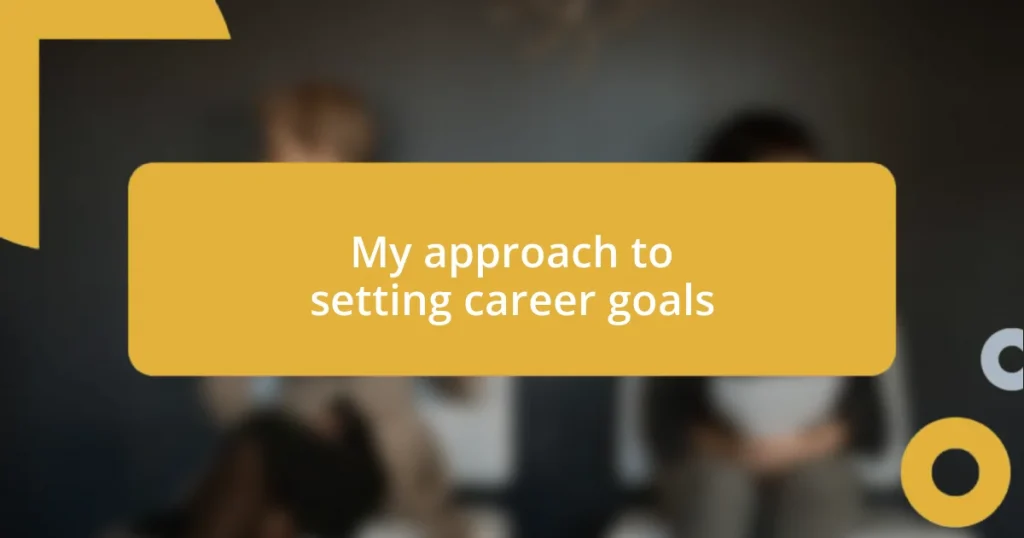Key takeaways:
- Setting SMART (Specific, Measurable, Achievable, Relevant, and Time-bound) career goals enhances clarity, accountability, and personal growth.
- Identifying personal values and interests is crucial for setting meaningful goals that align with one’s passions and lead to a fulfilling career.
- Regularly tracking progress and remaining flexible in your action plan help adapt to challenges and seize new opportunities on your career journey.

Understanding career goal setting
Setting career goals isn’t just about aiming for the next promotion or lateral move; it’s about envisioning where you truly want to be in the future. I remember when I first took a step back to evaluate my career trajectory. I discovered that distinguishing between short-term objectives and long-term aspirations allowed me to develop a clearer roadmap for success.
Have you ever felt overwhelmed by the vast possibilities in your career? I can relate. Early in my journey, I struggled to choose between various interests, and it wasn’t until I embraced the idea of SMART goals—specific, measurable, achievable, relevant, and time-bound—that I started seeing progress. Figuring out what truly mattered to me helped to simplify the options and point me in a direction that felt right.
Emotional intelligence plays a crucial role in this process, too. Understanding what drives you on a deeper level can make goal-setting feel more authentic and fulfilling. I often ask myself: Why do I want to achieve this goal? The moment I connected my ambitions to my core values, it felt like I was not just chasing success, but crafting a career that resonated with who I am. That’s a game-changer.

Importance of setting career goals
Setting career goals acts as a compass, guiding you through the often-chaotic landscape of professional life. I’ve experienced firsthand how defining these goals brings clarity and focus to my decisions. When I took the time to write down my aspirations, I could prioritize my tasks effectively, which made it easier to allocate time to what truly mattered.
Moreover, having clear career goals fosters accountability. When I committed to achieving specific targets, I felt a stronger sense of responsibility—not just to myself, but also to my colleagues and mentors. This commitment transformed my work ethic, igniting a passion that kept me engaged and motivated through challenges that once felt daunting.
Lastly, setting career goals enables personal growth and skill development. I recall when I wanted to transition into a leadership role; I identified the skills I needed to build. Actively pursuing those skills not only prepared me for advancement but also opened up new opportunities for collaboration and innovation. Realizing this transformative effect has encouraged me to embrace learning as an integral part of my career journey.
| Benefits of Setting Career Goals | Impact on Career Growth |
|---|---|
| Brings clarity and focus | Improves decision-making |
| Fosters accountability | Enhances motivation |
| Encourages personal growth | Opens new opportunities |

Identifying personal values and interests
Identifying personal values and interests is a foundational step in setting meaningful career goals. I vividly recall a period in my career when I felt restless and unfulfilled. It wasn’t until I took the time to list my core values—like creativity, community, and integrity—that I recognized how much I craved a job that aligned with those principles. This exploration provided clarity and helped me understand what truly drives me, enabling me to make choices that felt right.
To further narrow down what resonates with you, consider the following questions:
- What activities make you lose track of time?
- What do you feel passionate about, even outside of work?
- When do you feel the most energized and fulfilled?
- What causes or issues do you care deeply about?
- What kinds of environments make you feel most productive and happy?
Reflecting on these aspects can bring you closer to feeling aligned in your career. Balancing what you love with your day-to-day responsibilities can lead to a more satisfied professional life.

Creating SMART career goals
Creating SMART career goals is an enriching process that has transformed my own journey. Each letter in the SMART acronym stands for Specific, Measurable, Achievable, Relevant, and Time-bound. For example, rather than saying, “I want to improve my skills,” I shifted to “I will complete a project management course by the end of this year.” This specificity not only made my goal clearer but also set a concrete timeline for my progress.
I remember setting a goal to increase my network by attending professional events. That became SMART when I specified attending at least one industry conference every quarter. It was a game-changer! Tracking my progress helped me realize I wasn’t just meeting new people—I was building relationships that contributed to my growth and learning. Does your current networking approach bring you the connections you really need?
Finally, relevancy is crucial. Sometimes, I’ve found myself pursuing goals that, upon reflection, didn’t align with my true interests. For example, I once aimed to gain a certification that everyone in my field seemed to value. After looking deeper, I realized my passion lay elsewhere. By reassessing, I could focus not just on what was popular but on what truly resonated with me—ultimately leading to richer opportunities that were fulfilling both personally and professionally.

Developing an action plan
Developing an action plan is where the rubber meets the road in achieving your career goals. From my experience, breaking down larger goals into manageable tasks is a game-changer. For instance, when I aimed to switch industries, I created a checklist that included updating my resume, connecting with professionals in the field, and setting aside time each week to learn new skills. This clarity transformed what felt like a daunting leap into a series of achievable steps.
I’ve also discovered that regular check-ins with myself can be incredibly motivating. Just the other week, I sat down with my action plan and evaluated my progress. It turns out that scheduling time to reflect on my achievements—big and small—boosted my confidence. I felt more in control of my trajectory. How often do we forget to pause and celebrate our victories? Making this a regular practice not only keeps us accountable but also fuels our enthusiasm.
Lastly, I firmly believe that flexibility in our action plans is essential. There was a time when I fixated on following my plan to the letter, only to realize that some opportunities emerged unexpectedly. When I was offered a chance to volunteer on a project that aligned perfectly with my goals, it felt liberating to recalibrate my action steps. This adaptability has taught me that while plans provide direction, being open to new possibilities can lead to enriching paths I never saw coming. Are you allowing room for spontaneity in your own journey?

Tracking progress and adjusting goals
Tracking my progress towards achieving goals has always been pivotal in my career development. I remember when I set a goal to learn a new coding language within six months. To keep myself accountable, I created a simple spreadsheet to log my weekly study hours and completed exercises. Each marked box not only illustrated my commitment but also fueled my motivation to push through the moments of frustration. Have you ever considered how visualizing your progress can ignite your drive?
Adjusting my goals has become a natural part of my journey. When I initially aimed for a promotion within my company, I quickly realized that my skill set wasn’t aligned with the required competencies. Instead of seeing this as a setback, I reassessed my objectives. I asked myself: what skills do I genuinely enjoy developing? By adjusting my focus to enhance areas that excited me, I found renewed passion for my career—and I ended up spearheading projects that not only showcased my strengths but also made a difference within my team.
What I’ve learned is that tracking and adjusting goals is an ongoing cycle. Just last year, I set a goal to enhance my public speaking abilities, attending workshops and practicing in front of friends. But halfway through the year, I felt stagnant. Reflecting on my progress, I decided to switch gears and seek opportunities for real-world application, like presenting at local meetups. This pivot not only sharpened my skills but also expanded my network in unexpected ways. How have you adapted your goals to ensure you’re moving forward?

Overcoming obstacles in career planning
There have been times when I faced significant obstacles in my career planning. One memorable instance was when I thought I’d hit a wall due to a lack of relevant experience for a desired position. I remember feeling overwhelmed, but instead of succumbing to frustration, I focused on what I could control. I began volunteering for tasks in my current role that aligned with my target job. That proactive step not only helped me build confidence but opened doors to networking opportunities I hadn’t anticipated.
Managing internal fears has also been pivotal for me. When considering a significant career shift, I became anxious about leaving my comfort zone. It was during this period of self-doubt that I stumbled upon a powerful phrase: “What’s the worst that can happen?” By shifting my perspective, I realized that taking risks often leads to rewarding experiences. Embracing fear as a natural part of growth became my mantra, allowing me to face uncertainties with a more open heart.
Finally, I strongly believe that seeking mentorship can be a game-changer in overcoming hurdles. I sought guidance from a former colleague who had successfully navigated a similar career transition. Their insights were invaluable, shedding light on pitfalls to avoid while providing a sense of reassurance. Have you ever considered how a mentor could help illuminate your path? I’ve found that sharing your journey with someone experienced can not only inspire you but also supply strategies that you might not have thought of on your own.















